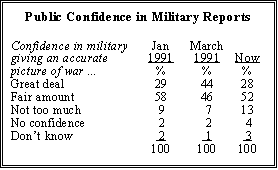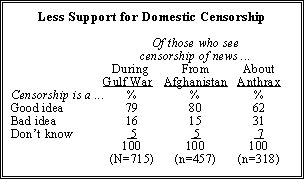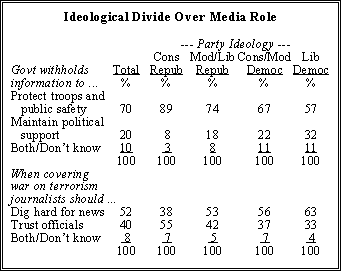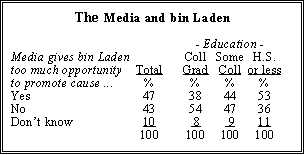
From the beginning of the crisis, the public has given the press high marks for its coverage of the attacks and the war against terrorism. In the current survey, better than three-quarters of Americans (77%) say coverage has been good or excellent, which is on par with the positive rating the public gave the press during the Gulf war (78% good or excellent).
But there has been a significant decline in the number of people who rate the media’s performance as excellent since the first week of the crisis. Three-in-ten give that rating now, compared with 56% who viewed coverage as excellent in the Sept. 13-17 survey. Nearly all of the drop occurred between mid-September and mid-October; since then, the ratings have remained fairly stable.
There are few notable differences in how major political and demographic groups evaluate the media’s coverage. But Americans who have the strongest interest in the crisis are more satisfied with coverage than those with less interest. Roughly four-in-ten (42%) who are highly interested in terrorism news view the coverage as excellent, compared with 31% of those with a moderate level of interest and 21% who express little interest.
As many as 65% of Americans think that the media’s coverage of the war has been accurate, while only 17% say too many mistakes have been made. This is similar to the media’s accuracy rating during the Gulf war, when 61% judged the reporting as correct and 18% saw it as error-prone.
While still generally favorable, coverage of the homefront gets more mixed reviews for accuracy. A solid majority (58%) views news on anthrax and other homefront threats as accurate, but nearly one-in-three (30%) see too many mistakes in this coverage. In assessing blame for these errors, twice as many people cite misleading information by the government as sloppy reporting by the media (16%-8%).
Two-thirds of Republicans (66%) say the anthrax coverage has for the most part been accurate, compared with barely half of Democrats (52%). Of those who view coverage as error-ridden, most Republicans point the finger at poor reporting by the news media, while Democrats who see errors in coverage overwhelmingly blame the government for providing misleading information.
Confidence in Government Information, As Well

The public also has confidence that information provided by the government on the war and domestic anti-terrorism efforts is accurate, but only a minority has a high degree of confidence. About half (52%) have a fair amount of confidence that the government is giving an accurate picture of the war, while better than a quarter (28%) have a great deal of confidence. That is comparable to confidence levels during the Gulf war, although confidence rose sharply in March 1991 after that conflict’s successful conclusion. Public confidence in information provided by the government on anti-terrorism efforts in the United States is somewhat lower (61% fair amount, 19% great deal).
Partisan differences are evident – Republicans are more likely to express a high degree of confidence that the military and other government agencies are giving a clear picture of what is happening on both fronts. Nearly four-in-ten Republicans (39%) say they have a lot of confidence in government information on the war, compared with 24% of Democrats and 20% of independents. Three-in-ten Republicans express a lot of confidence that the government is giving an accurate picture of developments on the homefront – just 14% of Democrats and independents agree.
Censorship Less Apparent Than In Gulf
Most Americans believe that news reports from Afghanistan are subject to military censorship, although the number who say that is much lower than it was during the Gulf war (59% vs. 76%). Fewer people (46%) think that news about anthrax and other domestic terrorist threats are being censored by the government.

While most Americans support censorship, some clearly distinguish between restrictions on overseas and domestic news, and they are much more comfortable with the former than the latter. By better than five-to-one, those who believe that news from Afghanistan is being censored favor those restrictions. That is on par with the level of support for censorship measured during the Gulf war. By contrast, there is about two-to-one support for government censorship of news on homefront threats.
Support for tight government control over the flow of information is reflected in other attitudes as well. Half the public believes the military should have greater influence over war reporting, while four-in-ten believe most decisions about how to report about the war should be left to news organizations. The partisan split in opinions toward the press also is seen in attitudes toward censorship and government restrictions: nearly six-in-ten Republicans (59%) want the military to exert more control over war reporting, compared with 41% of Democrats.
Trust or Verify?

But clearly, the public is of more than one mind when it comes to the competing interests of government and media during war time. Censorship is favored and 70% believe such restrictions are intended to protect the safety of U.S. forces rather than to cover up bad news. At the same time, a 52% majority endorses the idea that the media should aggressively pursue news rather than trust the government when it refuses to release information.
Republicans side strongly with the government on both issues. Fully 84% of Republicans believe that when the government withholds information about the war, it is to protect the security of U.S. troops. And Republicans, especially conservatives, are dubious of aggressive reporting by the media – by a 55%-38% margin, conservative Republicans say the media should trust government officials when they refuse to release information instead of going all-out to break stories.
Democrats are less persuaded than Republicans that the government mostly refuses to release information in the interest of protecting troops – a quarter of all Democrats, and nearly a third of liberal Democrats, say the government mostly withholds information on the war to hide negative news. Democrats strongly back aggressive reporting, with a solid majority (57%) saying the press should dig hard for stories.
Men and women also view the media’s role differently, with men more supportive of aggressive reporting. Better than half of men (56%) say the press should dig hard for facts, while 36% support a more trusting approach. Women are more evenly divided – 47% favor an aggressive approach while 44% believe the press should trust the government. But roughly seven-in-ten men and women agree that government decisions to restrict the flow of war information are based on legitimate security motives.
Divided Over bin Laden Access

While the public has a better view of the media, Americans are divided about whether news organizations are doing their jobs properly with regard to Osama bin Laden. A 47% plurality says that the media has given bin Laden too much exposure, while 43% say it has been careful to not give him too much opportunity to promote his cause.
College graduates are generally comfortable with the media’s handling of bin Laden – a majority (54%) says he has not been given too much of an opportunity to promote his cause. But those with less education express more concern over bin Laden’s media access. By a 53%-36% margin, those with a high school education or less say the media has given bin Laden too much access.




